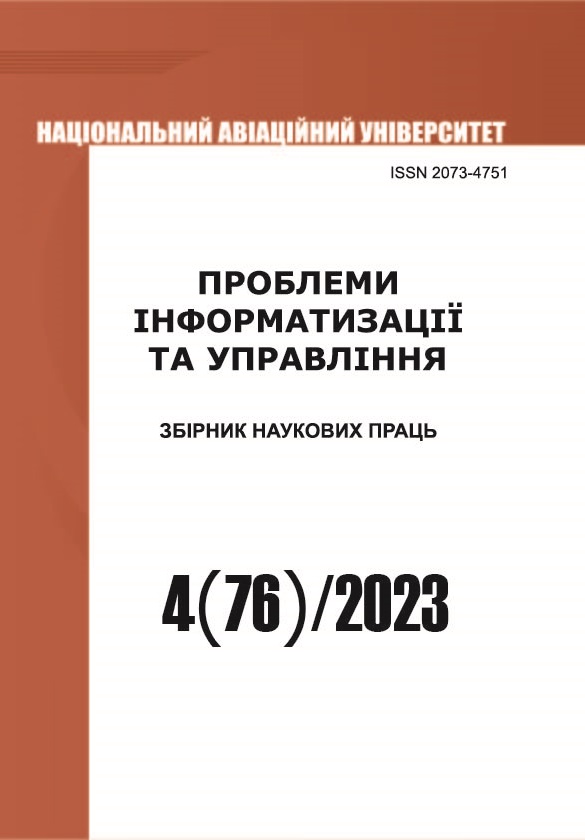Tuning of PID-controller by genetic algorithm according to multi-criteria objective function for controlling an unstable object
DOI:
https://doi.org/10.18372/2073-4751.76.18239Keywords:
PID controller, genetic algorithm, phase space, control object, objective functionAbstract
The task of adjusting an industrial-type regulator, namely a PID regulator, which has several parameters, namely the coefficients of proportional, integral, and differential links, is considered. In this study, the PID controller is used to control an unstable object with nonlinear dynamics. The task is to track the input signal with minimal overshoot, error, and settling time. At the same time, the problem of the optimal setting of a multi-parameter object to satisfy a multi-criteria objective function arises. Classical approaches to the optimization of several variable functions are faced with the need to find partial derivatives for each variable. At the same time, there are effective heuristic solutions that are based on a genetic algorithm, which creates an initial population, which is then updated by saving the best descendants and searching for new possible options. The article examines such an algorithm for stabilizing an unstable object whose characteristic equation has multiple zero roots. The paper presents the parameters of the algorithm and the results of modeling using modern techniques for modeling automatic control systems in phase space.
References
Astrom K.J., Hagglund T. PID controllers: theory, design, and tuning. ISA: The Instrumentation, Systems, and Automation Society; USA, 1995. 343 p.
Kucherov D., Kozub A., Tkachenko V., Rosinska G., Poshyvailo O. PID controller machine learning algorithm applied to the mathematical model of quadrotor lateral motion. 2021 IEEE 6th International Conference on Actual Problems of Unmanned Aerial Vehicles Development (APUAVD) / Kyiv, Ukraine, 2021. P. 86–89.
O'Mahony T., Downing C.J., Fatla K. Genetic Algorithms for PID Parameter Optimisation: Minimising Error Criteria. 2002. 6 p.
Mirzal A., Yoshii S., Furukawa M. PID Parameters Optimization by Using Genetic Algorithm. URL: https://arxiv.org/ftp/arxiv/papers/1204/1204.0885.pdf
Субботін С.О., Олійник А.О., Олійник О.О. Неітеративні, еволюційні та мультиагентні методи синтезу нечіткологічних і нейромережних моделей: Монографія. Запоріжжя : ЗНТУ, 2009. 375 с.
Кучеров Д.П. Налаштування ПІД-регулятора за допомогою генетичного алгоритму. Інтегровані інтелектуальні робототехнічні комплекси (ІІРТК-2023): Шістнадцята міжнародна науково-практична конференція 23-24 травня 2023 р. / НАУ. Київ, Україна, 2023. С. 212–213.
Ogata K. Modern control engineering. Prentice Hall, Pearson, 2009.
Downloads
Published
Issue
Section
License
Автори, які публікуються у цьому журналі, погоджуються з наступними умовами:- Автори залишають за собою право на авторство своєї роботи та передають журналу право першої публікації цієї роботи на умовах ліцензії Creative Commons Attribution License, котра дозволяє іншим особам вільно розповсюджувати опубліковану роботу з обов'язковим посиланням на авторів оригінальної роботи та першу публікацію роботи у цьому журналі.
- Автори мають право укладати самостійні додаткові угоди щодо неексклюзивного розповсюдження роботи у тому вигляді, в якому вона була опублікована цим журналом (наприклад, розміщувати роботу в електронному сховищі установи або публікувати у складі монографії), за умови збереження посилання на першу публікацію роботи у цьому журналі.
- Політика журналу дозволяє і заохочує розміщення авторами в мережі Інтернет (наприклад, у сховищах установ або на особистих веб-сайтах) рукопису роботи, як до подання цього рукопису до редакції, так і під час його редакційного опрацювання, оскільки це сприяє виникненню продуктивної наукової дискусії та позитивно позначається на оперативності та динаміці цитування опублікованої роботи (див. The Effect of Open Access).


